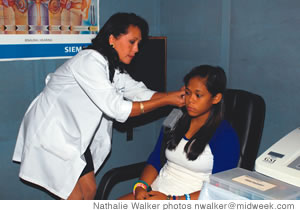A Ringing In The Ears
Interviewed by Rasa Fournier
Wednesday - August 25, 2010
E-mail this story | Print this page | Comments (0) | Archive
 Del.icio.us Share
Del.icio.us Share

DR. SCARLET AVILES
Audiologist at The Queen’s Medical Center
Where did you receive your schooling/training?
At the University of Hawaii at Manoa and then I got my doctorate at the University of Florida at Gainesville. I was born on Oahu and raised on the Big Island.
How long have you been practicing?
Twenty years in Hawaii.
Can you describe what you do?
In Dr. Gene Doo’s office here at Queen’s, I run the audiology program. We have one of the most comprehensive audiology programs in the state.
Can you talk about some of your procedures in layman’s terms?
We do basic hearing assessments and vestibular testing, which is inner ear balance. We also do some occupational audiology, so we have a lot of police officers, firefighters and PUC (Public Utilities Commission) licensed drivers come through for annual hearing tests. We do custom earplugs for hearing protection, as well as for swimming and for kids who have had ear surgery. We also do aural rehabilitation, and with that we do a lot of hearing aid fittings and counseling for the patients and the spouse or family. We do tinnitus management now because that seems to be a huge problem, and there really hasn’t been much success with any specific type of treatment.
Some audiologists only do hearing aid fittings and counseling, some specialize in balance testing. Here we touch on just about everything. So it’s very busy and hard to keep up because there’s so many different fields. We work with infants all the way up to geriatric.
What is tinnitus?
Ringing in the ears. It’s not a disease. It’s a symptom of a problem - of hearing loss due to aging, or sometimes if a patient has impacted ear wax, or middle ear problems, where the bones are fixated. Also, noise-induced hearing loss, acoustic neuroma or eighth-nerve tumors - all of those are problems associated with tinnitus. Taking large doses of aspirin, caffeine and alcohol, as well as stress, also are associated with tinnitus.

|
Can you mention some of the advancements in the field of tinnitus?
We’re just starting something new. It’s supposed to be a huge advancement. They call it digital “tinnitus sound generators.” It’s a very advanced digital amplifier, a combination hearing aid and masker. It’s digitally processed and we’re able to take the sound generated by the instrument and modify it. Before you couldn’t. Now you can modify what frequency it’s at and do individual settings per patient based on what kind of tinnitus they have. The patients can modulate the sound, so instead of having a white noise, they can do ocean waves. A lot of the features are automatic, so you don’t have to worry about teaching patients how to push buttons or use remote controls. The goal of fitting a patient with a masker is you’re trying to mask the tinnitus or the ringing noise that is annoying to the patient with a more comforting and soothing sound. So you kind of distract their attention from that buzzing or high-pitched noise and then they’re listening to ocean waves or waterfalls.
When we set the instrument, it will react. So if it’s a really quiet environment, the instrument knows that in quiet a lot of times the tinnitus is louder so it’ll actually increase the level of the masking noise. There’s no real cure for tinnitus, but at least there’s help with these instruments.
There are more than 50 million people affected with tinnitus and we see it a lot here in Hawaii.
Do iPods cause hearing loss?
iPods have become so popular, and I have teenagers so I know it’s a big part of their lives. The population that’s using iPods is from around 12 to maybe in their 25-30s. The use of the iPod and the popularity raises questions about potential damages to the hearing system. To answer your question, right now we don’t know. Since noise-induced hearing loss is usually gradual, you won’t know until several years down the road. Recent studies show that some listening devices - iPods, MP3 players - can actually output more than 110 decibels. According to the U.S. Dept. of Labor OSHA (Occupational Safety and Health Act) and NIOSH (National Institute of Occupational Safety and Health), any sound level 85 decibels and higher is considered dangerous and hazardous. When you look at 85 and you look at 110, there is some serious concern there. It warrants a lot more research.
What can parents do?
A good thing is oto-acoustic emission testing. It’s a new test and it looks at specific cochlear (inner ear) outer hair cells. That’s where noise-induced hearing loss usually is. You can run an OAE on a person and detect any early damage to the cochlear hair cells. If you have people exposed to loud noise, or children - like my teenager - who love to use their iPods, I would bring them in for testing. Find out early, because once the hearing loss starts - most people don’t realize it until it gets at maybe a 30 or 40 decibel level - by then too much time has gone by and it becomes permanent hearing loss. Parents have to set limits on the listening devices that kids are using. Nobody should be using it at maximum levels. There’s individual susceptibility, too - some people are more susceptible to noise-induced hearing loss than other people. So be very careful. Protect your hearing because once you lose it, it’s gone.
E-mail this story | Print this page | Comments (0) | Archive
Most Recent Comment(s):













